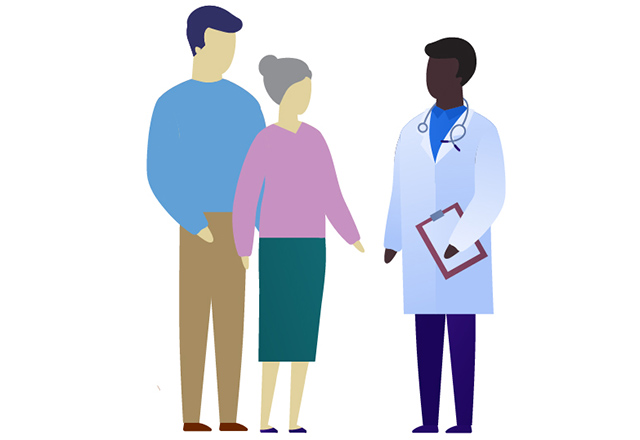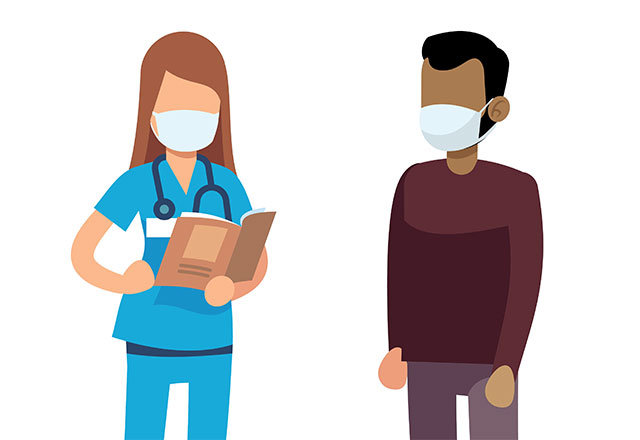Before visiting Johns Hopkins Medicine's facilities:
- Review our guidelines and the responsibilities of a care partner.
- Do not visit a patient at our facilities if you have COVID-19 or flu-like symptoms.
- Bring your mask and wear it over your nose and mouth at all times during your visit, even if you are fully vaccinated and boosted against COVID-19. This is to protect our vulnerable, high-risk patients.
Care partners who do not comply with care guidelines may be asked to leave Johns Hopkins Medicine’s facilities.
I wish to:
-
Accompany Adult/Pediatric Outpatient
Outpatient appointments do not require an overnight hospital stay.

-
Accompany Adult/Pediatric Inpatient
Inpatient appointments require an overnight hospital stay.

-
Connect Virtually with a Patient
Virtual connections can be made during outpatient and inpatient appointments.

-
Review Care and Safety Guidelines
Care and safety guidelines are required of all outpatient and inpatient appointments and visitors.


Caring for You & Others
The best way to protect yourself and your loved ones from COVID-19 is to get vaccinated and boosted when eligible, follow testing guidelines, wear a mask, wash your hands and practice physical distancing.
Safety Guidelines Update
Face masks are required to enter any of our care facilities and expected to be worn at all times, even if you are fully vaccinated and boosted against COVID-19. We will provide a mask if needed.
Neck gaiters, bandanas, masks with exhalation valves, or clear shield-like face masks are not permitted to be worn as face coverings at Johns Hopkins Medicine facilities.
Outpatient Guidelines
Starting Monday, November 14, 2022:
Johns Hopkins Medicine outpatient clinics and surgery centers in Maryland and Washington D.C., including Johns Hopkins Children's Center clinics
Johns Hopkins All Children’s Hospital - St. Petersburg, Florida
- Green level - more open (pediatric outpatient)
Please review the full Johns Hopkins All Children’s visitor policy for more information.
Inpatient Guidelines
Starting Monday, November 14, 2022:
The Johns Hopkins Hospital
Adult inpatient visits: Please use entrances at the Nelson Building (600 N. Wolfe St.) or at the Zayed Building, Ground or Main Level (1800 Orleans St.)
Johns Hopkins Children’s Center
- Green level - more open - (inpatient) (Confirmed or Suspected COVID-19)
- Green level - more open - (inpatient) (Patients who do not have COVID-19/are not suspected of having COVID-19)
Visit the Johns Hopkins Children’s Center page for more information
Pediatric inpatient visits: Please use the Children’s Center entrance at the Bloomberg Building (1800 Orleans St.)
Johns Hopkins Bayview Medical Center
Surgery Patients: Please park in the garage and use the Bayview Medical Offices (blue awning entrance). One care partner may escort you to register, then your care partner will be asked to wait in one of the recommended respite areas on or around the campus.
Howard County General Hospital
Suburban Hospital
Please check with the facility on additional visitation restrictions.
Sibley Memorial Hospital
Please use Building B entrance at 5255 Loughboro Rd. NW
Johns Hopkins All Children’s Hospital
- Green level - more open (inpatient)
Please review the full Johns Hopkins All Children’s visitor policy for more information.
Resources to Connect Virtually to Patients

During all visitation risk levels, we encourage phone and video visits. See a list of resources to connect to loved ones in the hospital. Our care staff can help set this up.
Patient Belongings and Essential Items
If a care partner is unable to visit due to safety restrictions or other reasons and the patient requires essential items from home, these items may be dropped off at the following locations. Please only bring essential items, such as hearing aids, glasses, dentures, communication devices (mobile phones, laptops, chargers), and small, inexpensive spiritual or religious items. Each hospital has a specific location for dropping off items.
- The Johns Hopkins Hospital: Items may be dropped off at the front desk at the Zayed, Weinberg and Nelson buildings.
- Sibley Memorial Hospital: Items may be dropped off at screening tables in Buildings A, B and D.
- Suburban Hospital: Items may be dropped off at the main hospital entrance and given to the security officer at the information desk. Security will be responsible for tracking and delivering items to the clinical areas.
- Howard County General Hospital: Items may be dropped off at the visitor entrance.
- Johns Hopkins Bayview Medical Center: Items may be dropped off at the red awning entrance.
- Johns Hopkins All Children’s Hospital: Items may be brought in by parents or guardians.
Care Partner Guidelines: What You Need to Know
The health and safety of our patients, families and staff members is our top priority. Our care partner visitation guidelines balance preventing the spread of the coronavirus that causes COVID-19 with the needs of our patients and their loved ones. A care partner may be a relative, partner, friend or anyone the patient chooses to have at their side during care. For inpatient visits, care partners must be 18 or older, except for those under 18 who are parents of patients. Guidelines may vary slightly depending on care needs and location.
We continue to monitor the spread of COVID-19 in our community and may update the guidelines as needed to provide safe care to everyone.
The State of Maryland’s Support Persons for Individuals with Disabilities (PDF)
Care Partner Guidelines
Care partners must follow all of the following safety precautions, even if fully vaccinated and boosted against COVID-19. Care partners who do not comply with these guidelines will be asked to leave Johns Hopkins Medicine facilities.
-
Johns Hopkins uses four color-coded visitation risk levels to determine how we can safely invite care partners to join patients during outpatient office visits and inpatient stays. These guidelines help protect our patients, their care partners and our staff members by limiting spread of the coronavirus that causes COVID-19. The visitation risk levels are based on the number of COVID-19 cases in the community according to state and county public health information, as well as conditions in our health care environments.
Risk levels are assessed and adjusted regularly.
-
A care partner may be a relative, partner, friend or anyone the patient chooses to have at their side during care. For inpatient visits, care partners must be 18 or older, except for those under 18 who are parents of patients. Guidelines may vary slightly depending on care needs and location. The number of care partners welcomed will depend on the area of the hospital and patient circumstances.
-
Do not come to a Johns Hopkins Medicine facility to visit a patient under any circumstances if you:
- Feel sick
- Have symptoms of COVID-19 or flu-like symptoms
- Tested positive for SARS-CoV-2, the coronavirus that causes COVID-19 within the last three weeks.
- Have been advised to get a COVID-19 test but have not yet obtained one
- Are waiting for the results of a COVID-19 test
- Have been in contact with someone who has tested positive for COVID-19 within the last two weeks.
- Have been asked to be on home quarantine or isolation.
-
Wear a face mask that fully covers your nose and mouth at all times. The following face coverings are not approved: bandanas, gaiters, masks with exhalation valves or clear shield-like face masks. A mask will be provided for you if you need one. Care partners found not wearing a mask may be asked to leave.
For more information about face masks see the How to Properly Wear a Face Mask: Infographic and the Coronavirus Face Masks & Protection FAQs
-
If you become symptomatic or test positive for COVID-19 within 3 days of visiting a patient in the hospital, notify the patient’s provider, nurse, or the charge nurse on the patient’s hospital unit.
-
Care partners who can visit adult patients according to the guidelines must arrive at the hospital front entrance between 8 a.m. and 7 p.m. and must exit the hospital no later than 9 p.m.
Care partners/parents/guardians for patients in the pediatric emergency room and for pediatric inpatients may arrive 24/7.
-
Care partners must always wear a mask, including in the patient room. Care partners must remain in the patient’s room except:
- to use the restroom
- to get something to eat or drink outside of the patient’s room
- when directed by the care team to exit the room
- to leave for the day
Under the Yellow, Red, and Purple risk levels, care partners are not allowed to eat or drink in adult patient rooms or the Neonatal Intensive Care Unit (NICU). Under the Green risk level, care partners are allowed to eat and drink in adult patient rooms and the NICU. However, care partners must stop eating and drinking and put masks back on when staff members enter the room.
-
Please review the risk level guidelines for care partner switches during the visit. To prevent overcrowding in waiting areas, care partner exchange – if the visitation level permits – must occur outside the hospital or in lobby areas.
-
Overnight stays for one care partner are permitted for adult patients during green, yellow, red and for approved exceptions in purple risk level if the care partner is fully vaccinated against COVID-19 or has tested negative for the coronavirus that causes COVID-19 within 72 hours of the visit. People are considered fully vaccinated two weeks after the second shot of a two-dose vaccine or two weeks after a one-dose vaccine.
Care partners who plan to stay overnight should carry documentation of vaccination or test results with them and be prepared to show the documentation if asked.
Intensive care units may have restrictions on overnight visits based on space limits. Please check with your care team.
JHH Friendly Faces
To help connect patients with their loved ones, we have created a way for friends and families to share pictures with hospital patients through email. Simply email your favorite photos to JHH Friendly Faces at [email protected], and a staff member will print up to eight photos per patient and deliver them to the patient’s bedside. Please make sure to include the patient’s full name and room number in the email. The goal of JHH Friendly Faces is to help our Johns Hopkins community feel a little closer to the people and things they care about during this stressful time.